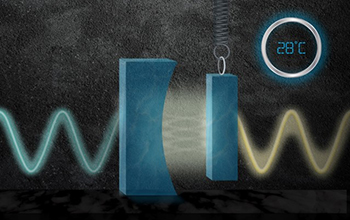Squeezing light could enhance quantum computing, gravitational wave detection

A "light squeezer" reduces quantum noise in lasers at room temperature.
Physicists at the Massachusetts Institute of Technology have designed a quantum "light squeezer" that reduces quantum noise in an incoming laser beam by 15%. It is the first system of its kind to work at room temperature, making it amenable to a compact, portable setup that may be added to high-precision experiments to improve laser measurements where quantum noise is a limiting factor.
"The importance of the result is that you can engineer these mechanical systems so that at room temperature they still can have quantum mechanical properties," says MIT's Nergis Mavalvala. "That changes the game completely in terms of being able to use these systems, not just in our own labs, housed in large cryogenic refrigerators, but out in the world."
The heart of the new squeezer is a marble-sized optical cavity, housed in a vacuum chamber and containing two mirrors, one of which is smaller than the diameter of a human hair. The larger mirror stands stationary while the other is movable, suspended by a spring-like cantilever.
The shape and makeup of this second "nanomechanical" mirror is the key to the system's ability to work at room temperature. When a laser beam enters the cavity, it bounces between the two mirrors. The force imparted by the light makes the nanomechanical mirror swing back and forth, allowing the researchers to engineer the light that exits the cavity to have special quantum properties.
The laser light can exit the system in a squeezed state, which can be used to make more precise measurements in quantum computation and cryptology, and in the detection of gravitational waves.
The National Science Foundation-funded research is published in the journal Nature Physics.






